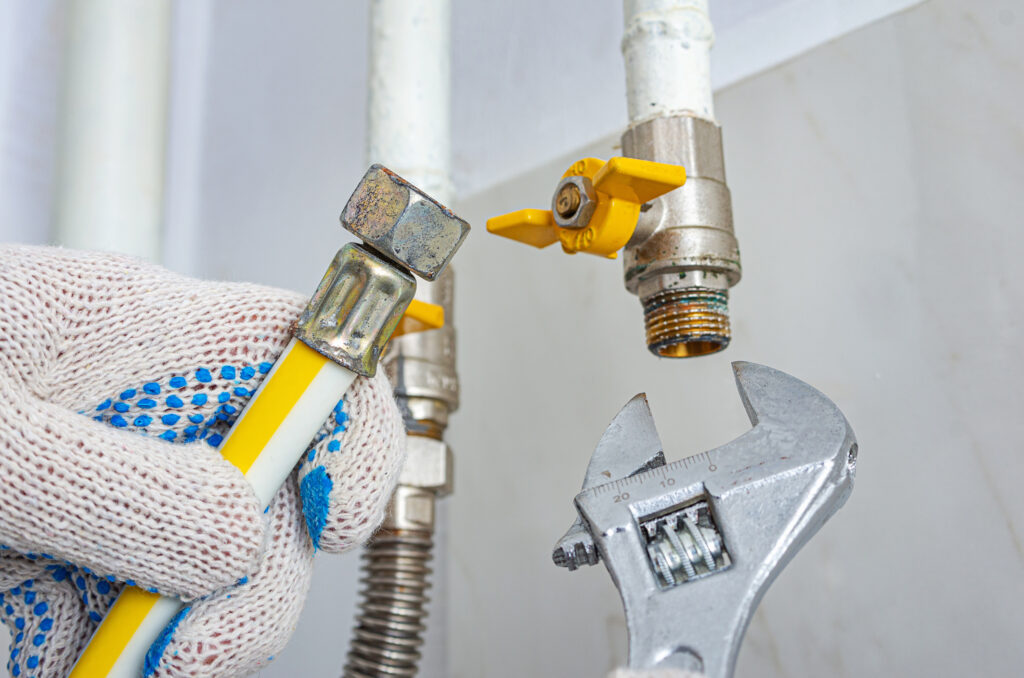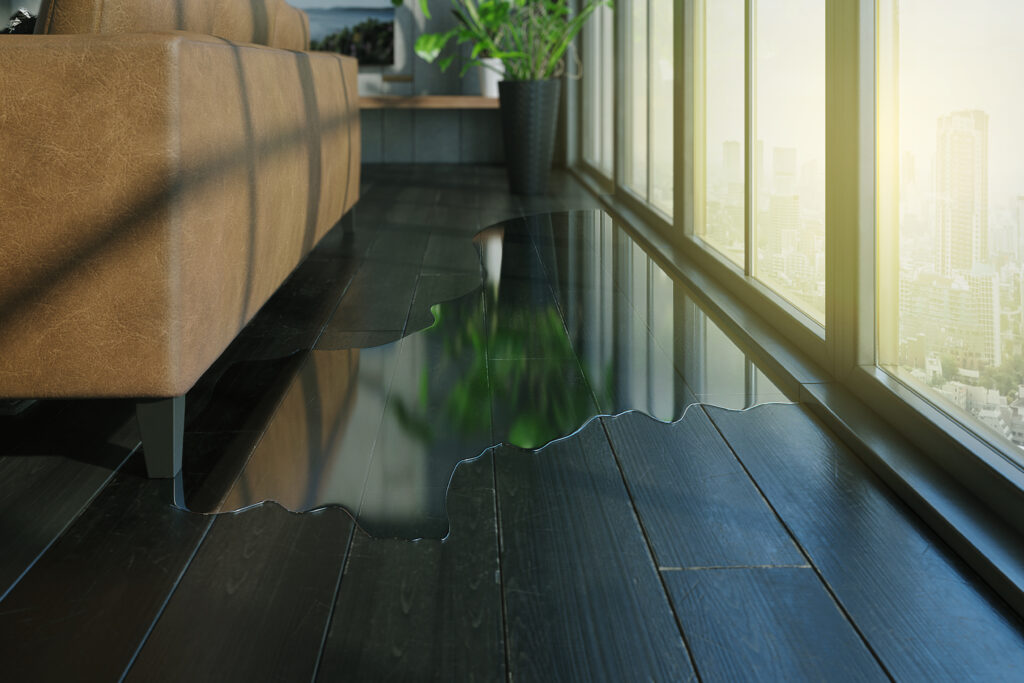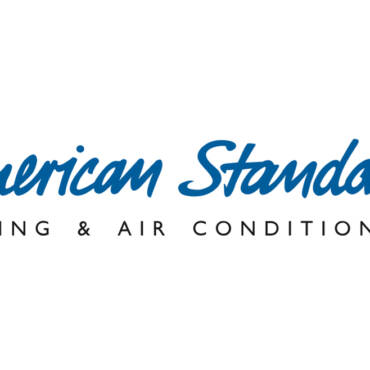Why Is High Water Pressure More Dangerous Than Low Water Pressure?
First, you should know what counts as normal water pressure for a residential system. Optimally, your house’s water pressure should be in the 40- to 60-PSI range. High pressure occurs when the pressure is over 80 PSI, the level at which destruction happens. Even if your house’s water pressure tends to be closer to 60 PSI, transient spikes can cause it to peak. Water pressure acts on your plumbing system every hour of every day, so keeping it under control is important.
High water pressure stresses pipes and joints, leading to fractures and plumbing leaks. Even a pinhole leak behind a wall can lead to major damage. Water damage from leaks can appear in drywall and even framing. Repairs for water damage may run into the tens of thousands of dollars, and some home insurance policies will deny such claims due to gradual rather than catastrophic damage.

It also wears out gaskets and seals. If your house has multiple faucets that leak around the handles, the water pressure could be damaging them. Pressure can also cause washing machines, dishwashers, and water heaters to fail prematurely. In many cases, this shortens appliance lifespans by 50%-70%. Some manufacturers won’t honor warranties for appliances destroyed by high water pressure.
What Causes High Water Pressure in a Home?
The first factor in water pressure is the municipal water supply. For example, some cities have to make seasonal adjustments during dry weather to keep hydrants capable of fighting fires. Older neighborhoods may have lines that are mismatched to the large water supply’s pressure, leading to increased pressure in homes.
Residential pressure ends up trapped in plumbing systems in many cases. Check valves may prevent pressure release. Thermal expansion drives pressure changes. Similarly, household water use shifts in day/night cycles, with pressure developing when demand is down. Unrelieved pressure can accumulate until it forces a way out through a seal, joint, or crack.

Local conditions also drive water pressure. If your house is at the bottom of a hill relative to the rest of the water supply, the pressure will likely increase. Proximity to a pumping station can also lead to greater pressure.
Failed or misadjusted pressure regulators lead to problems, too. The regulator is a component in your plumbing system that relieves incoming pressure. They can end up in failure conditions with blockages or weak springs. Some end up stuck open. A typical regulator should last 7 to 12 years. Signs of failure include the displayed pressure creeping up, inconsistent water flow in the household’s fixtures, and visible corrosion.
What Problems Can High Water Pressure Cause?
Leaking pipes are the sneakiest problems caused by high water pressure. They sit out of sight, meaning the only clues appear when they cause water damage, such as staining or rotten wood. Copper and galvanized steel pipes may develop pinhole leaks. Joints might separate because the pressure slowly pushes them apart. Solder joints are especially prone to failure. PEX fittings also blow out.
Seals in multiple systems can fail. This includes failures in:
- Toilet wax rings
- Faucet cartridge seals
- Appliance hoses
- Water heater tanks
Appliances themselves also can suffer damage, resulting in shorter lifespans. Most appliances aren’t manufactured to tolerate more than 80 PSI, and if failure is due to high pressure, it may void the warranty. Washing machines’ valves often fail. The pumps in dishwashers are also prone to issues. Ice maker lines may burst. Water filters develop cracks in the housings.
Structural damage also may ensue. Burst pipes and ruptured water heaters may cause flooding. Hidden leaks can collapse ceilings. Leaks in slabs can damage basements and foundations.
How Can I Tell if My Water Pressure Is Too High?
The simplest option is to perform your own gauge test. DIY gauges are available at most hardware stores for under $20. You should halt all household water usage for a couple of hours before testing. Attach the gauge to an outdoor spigot or a laundry room connection. Test once in the morning, afternoon, and evening. If any of the readings are above 60 PSI, then your home’s plumbing might have high water pressure.
Everyday clues include:
- Unexplained water bill increases
- Noisy appliances
- Banging or clanging pipes
- Running toilets
- Persistent faucet drips
Look for local clues, too. For example, your water pressure might go up when the municipality raises water pressure to compensate for a prolonged firefighting effort. There may also be signs of high water pressure in your yard, particularly soft patches or spots of pooled water on dry days.
What’s the Best Way to Prevent High Water Pressure Damage?
Regular checkups are just as important for your home’s plumbing system as they are for your body. If you’re comfortable using a gauge, perform a PSI test once a year. You can also have one of our plumbers perform an annual inspection and PSI test. If it’s high, they can identify and repair the cause of the high pressure, such as replacing the pressure regulator. You should also consider installing leak detection devices. Track the installation dates for your appliances’ hoses and replace them every few years.
How Do I Fix High Water Pressure and Keep It Under Control?
Your first attempt should involve locating the regulator and slowly adjusting it with a screwdriver. Recheck it frequently to see if the pressure remains stable. If the regulator has failed, have us install a new one. Annual plumbing inspections also make a big difference. Consider adding a smart leak detection and monitoring system, too.
Will My Homeowner’s Insurance Cover Damage From High Water Pressure?
Many policies distinguish between sudden and gradual damage. Make sure your policy states coverage for gradual damage in addition to big outbursts or floods. If something happens, document the scene quickly with photos and notes. Also, ask your insurer how reporting preventative measures might lower your premiums.
What’s the Bottom Line on High Water Pressure?
The bottom line is that high water pressure always corresponds with a high risk that a plumbing problem will occur. Leaks, indoor flooding, water damage, and ongoing water bill increases all eat away at your money unnecessarily.
The good news is that you can address the situation now. Schedule regular plumbing and sewer inspections, including camera inspections. We can perform PSI testing and check your plumbing system’s pressure regulator. Pay attention to the usage numbers from your water bill and compare them year-over-year for each month. If repairs are necessary, schedule plumbing work right away.
Blue Mountain Plumbing serves Fishersville, VA and the surrounding areas. We have been in business since 2002, and our company is fully licensed. Our plumbers work on a wide range of systems. If you’re worried about high water pressure in your home in Fishersville, contact Blue Mountain Plumbing as soon as possible.
Whether you require installation, repair, or maintenance, our technicians will assist you with top-quality service at any time of the day or night. Take comfort in knowing your indoor air quality is the best it can be with MOE heating & cooling services Ontario's solution for heating, air conditioning, and ventilation that’s cooler than the rest.
Contact us to schedule a visit. Our qualified team of technicians, are always ready to help you and guide you for heating and cooling issues. Weather you want to replace an old furnace or install a brand new air conditioner, we are here to help you. Our main office is at Kitchener but we can service most of Ontario's cities
Source link



